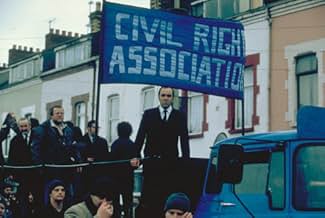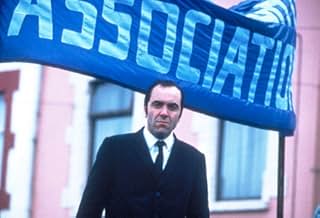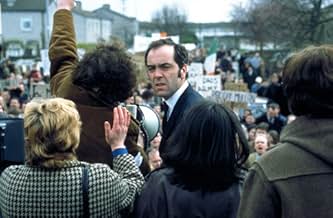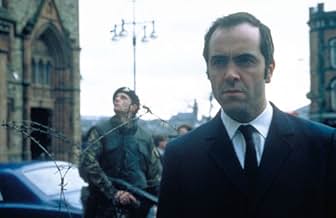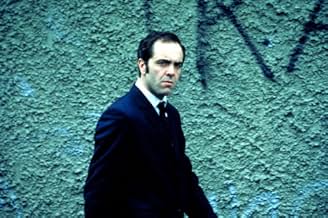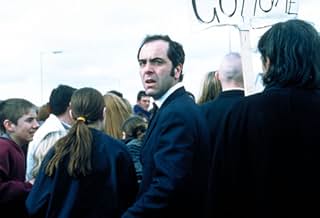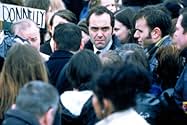Bloody Sunday
- 2002
- Tous publics
- 1h 51min
Adaptation cinématographique de la marche de protestation irlandaise pour les droits civiques et du massacre qui s'en suivit, lequel fut perpétré par les troupes britanniques le 30 janvier 1... Tout lireAdaptation cinématographique de la marche de protestation irlandaise pour les droits civiques et du massacre qui s'en suivit, lequel fut perpétré par les troupes britanniques le 30 janvier 1972.Adaptation cinématographique de la marche de protestation irlandaise pour les droits civiques et du massacre qui s'en suivit, lequel fut perpétré par les troupes britanniques le 30 janvier 1972.
- Réalisation
- Scénario
- Casting principal
- Victoire aux 1 BAFTA Award
- 19 victoires et 23 nominations au total
- Bridget Bond
- (as Carmel Mccallion)
- Maj. Steele
- (as Chris Villiers)
Avis à la une
But for an American audience with no benefit of subtitles for the brogues and working class Brit accents, no explanations outside of eventual context for lingo and slang (it took me awhile to keep track of "provos" vs "paras"), the quasi-documentary, in-your-face approach takes on a tragic universality.
It could be part of a Cassandra trilogy with `Black Hawk Down' and `No Man's Land' about why military should not be in charge in urban strife, whether as "peacekeepers" or in civil wars or regime changes, no matter how heinous the regime to be changed. A lesson for the Baghdad invasion planners?
Cities are complicated social ecologies, and the film shows a great diversity of attitudes and pressures on all sides, managing to be both clinical in meticulous detail and visceral in shocking impact. The film is probably not objective about the British (I don't think it's a coincidence that the imperious Brit "observer" who takes repugnant charge is played by Tim Pigott-Smith who was a similar colonialist in `The Jewel in the Crown.") A central universal image becomes the awesome power of rock-throwing, unemployed teen-age boys to spark war.
The liberals in the middle, clinging to dreams of Gandhi, Martin Luther King, and fair community relations, are morally destroyed over the course of a few hours and the extremists with guns on both sides feed on each other in perpetual destruction like the ouroboros image of the snake eating itself. I kept feeling I missed the exact flash point in a wandering attention moment and wanted to immediately re-watch it to see if I could track the gotcha! moment when escalation could have been prevented, so I look forward to this being available on video tape.
But the film does clearly show that it was attitudes that created the violent outcome and consequent government non-investigation, as we see in so many police situations. Once soldiers enter a city it is a police situation with all those complexities.
I know James Nesbitt primarily from frothy Irish comedies, like `BallykissAngel,' so his staggering portrayal of the M.P. in the middle is a revelation, as he goes from planning a civil rights march to pleading with his girlfriend to physical heroism to a break-down in shock.
The version of the titular U2 song played out at the end, running well past the credits finish, is a moving, live, passionate audience sing-along where Bono shouts out other locales that have experienced similar situations to emphasize the universality.
The acting, especially James Nesbit is excellent, the recreation of the mood is superb although it was obvious with the constant close ups that there was very little budget to recreate the scenery. The geography was never explained and therefore would leave a viewer without prior knowledge of the area disorientated.
The documentary suffered from not being able to set the scene, a lot had happened in the week prior to the Civil Rights march that put both the participants and the security forces on edge and made the advance more significant. The question of why the Paras were sent to Derry were never fully explored.
Overall it was flawless recreation of events from the point of view taken by the film makers on this particular incident. It is worth noting that this is based on the Irish Governments review of the Widgery report into Bloody Sunday. (NB the Widgery report is mostly considered by nationalists to be a white wash)
Le saviez-vous
- AnecdotesTo make this movie as authentic as possible, no lights were used in the movie and the camera work was entirely hand-held
- GaffesThe marchers carry homemade cardboard signs with slogans written on them. When shown from behind, some have modern printing ("Made in China") on them that are not appropriate for 1972.
- Citations
Ivan Cooper: I just want to say this to the British Government... You know what you've just done, don't you? You've destroyed the civil rights movement, and you've given the IRA the biggest victory it will ever have. All over this city tonight, young men... boys will be joining the IRA, and you will reap a whirlwind.
- Crédits fousThe live rendition of U2's Sunday, Bloody Sunday continues to play for a full three minutes over a black screen after the credits finish rolling.
- ConnexionsFeatured in The 2003 IFP Independent Spirit Awards (2003)
Meilleurs choix
Détails
- Date de sortie
- Pays d’origine
- Langue
- Aussi connu sous le nom de
- Domingo sangriento
- Lieux de tournage
- Sociétés de production
- Voir plus de crédits d'entreprise sur IMDbPro
Box-office
- Budget
- 2 000 000 £GB (estimé)
- Montant brut aux États-Unis et au Canada
- 773 228 $US
- Week-end de sortie aux États-Unis et au Canada
- 29 419 $US
- 6 oct. 2002
- Montant brut mondial
- 1 758 689 $US
- Durée
- 1h 51min(111 min)
- Couleur
- Mixage
- Rapport de forme
- 1.85 : 1

